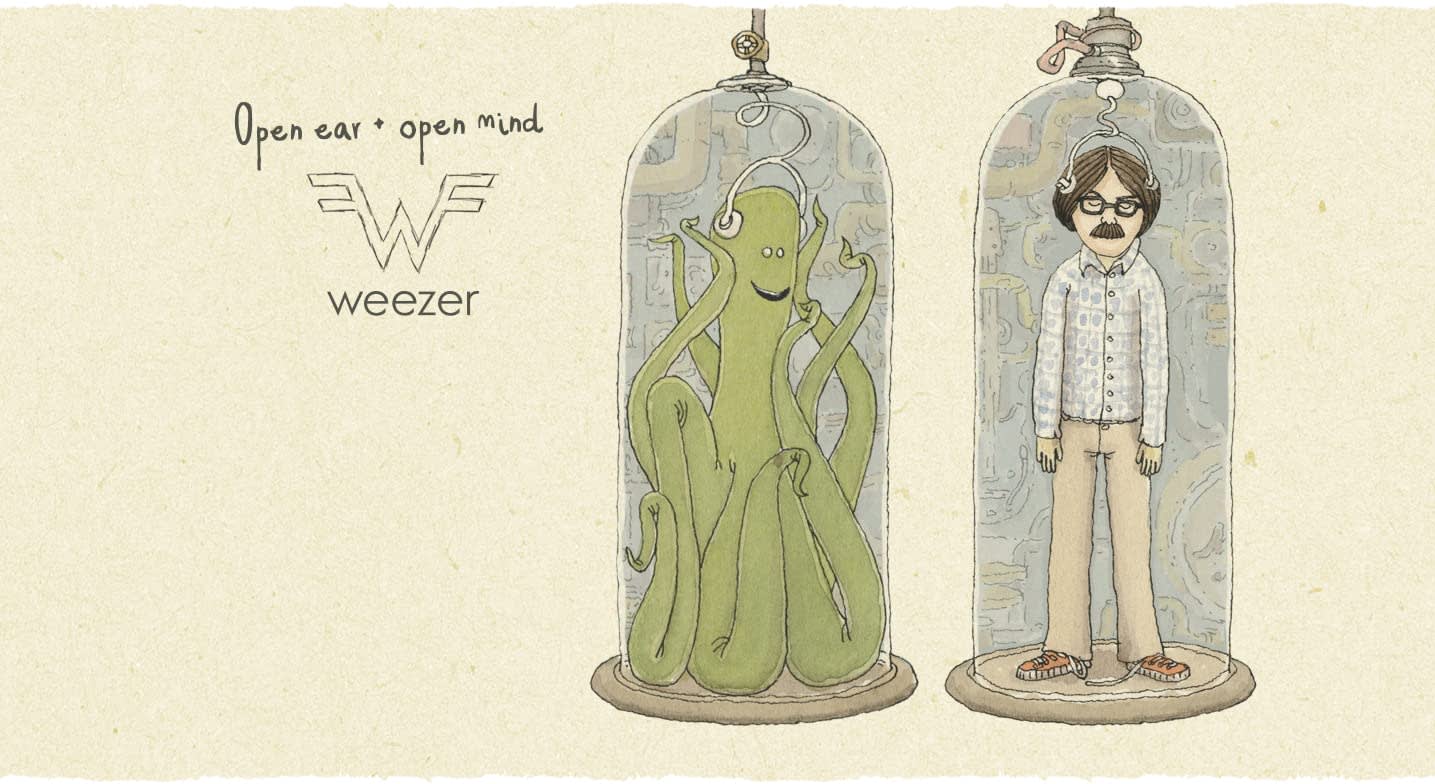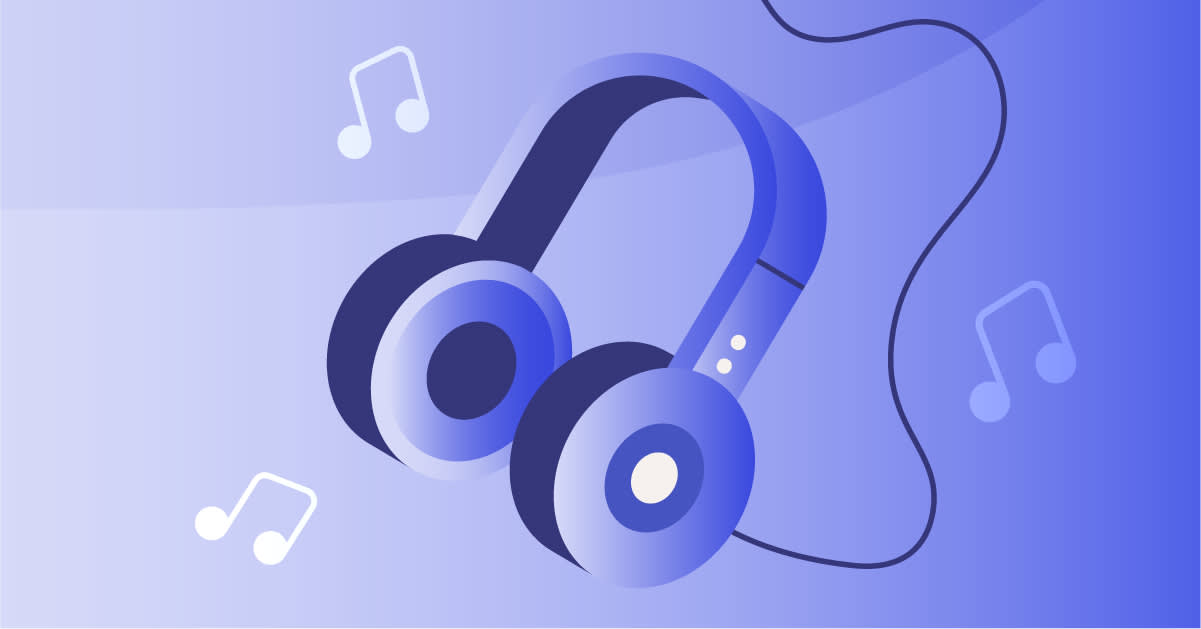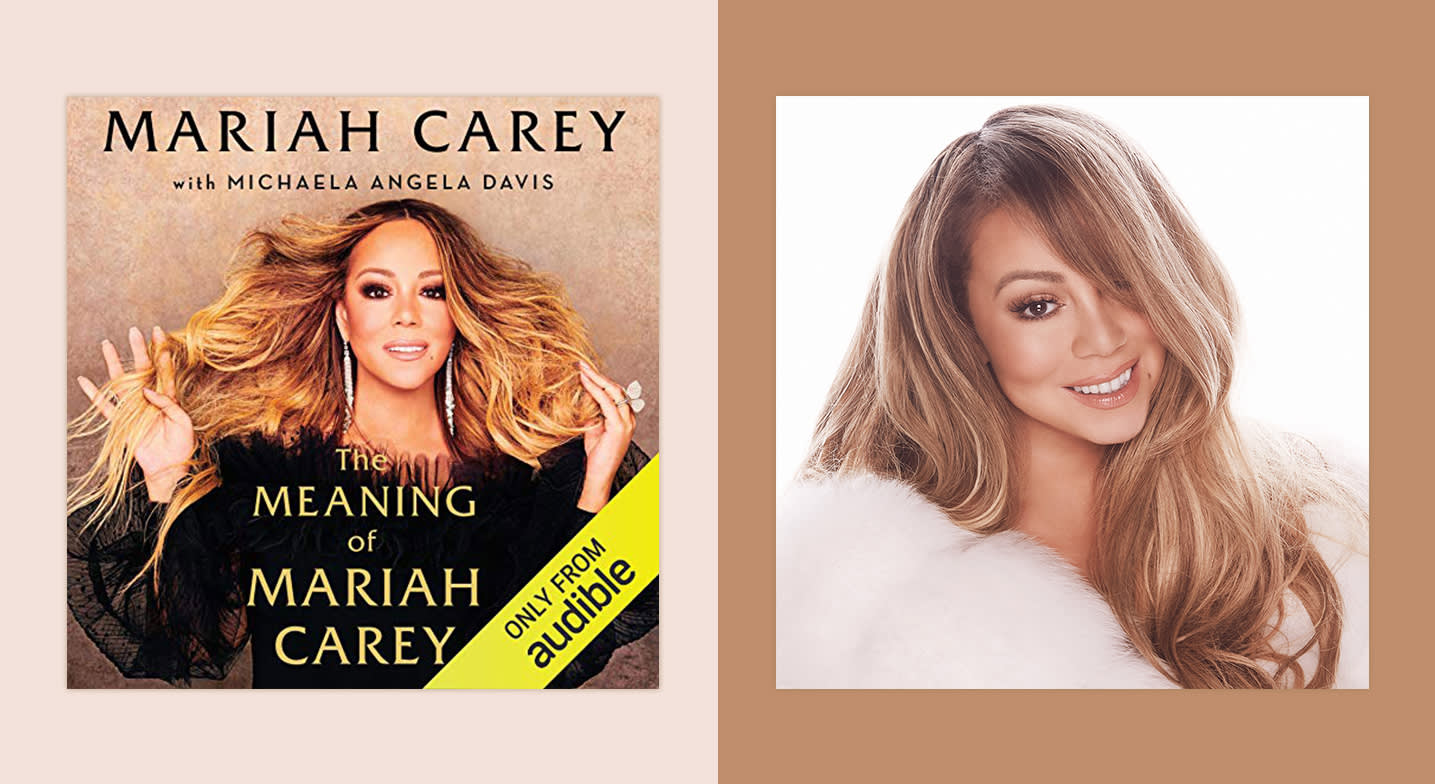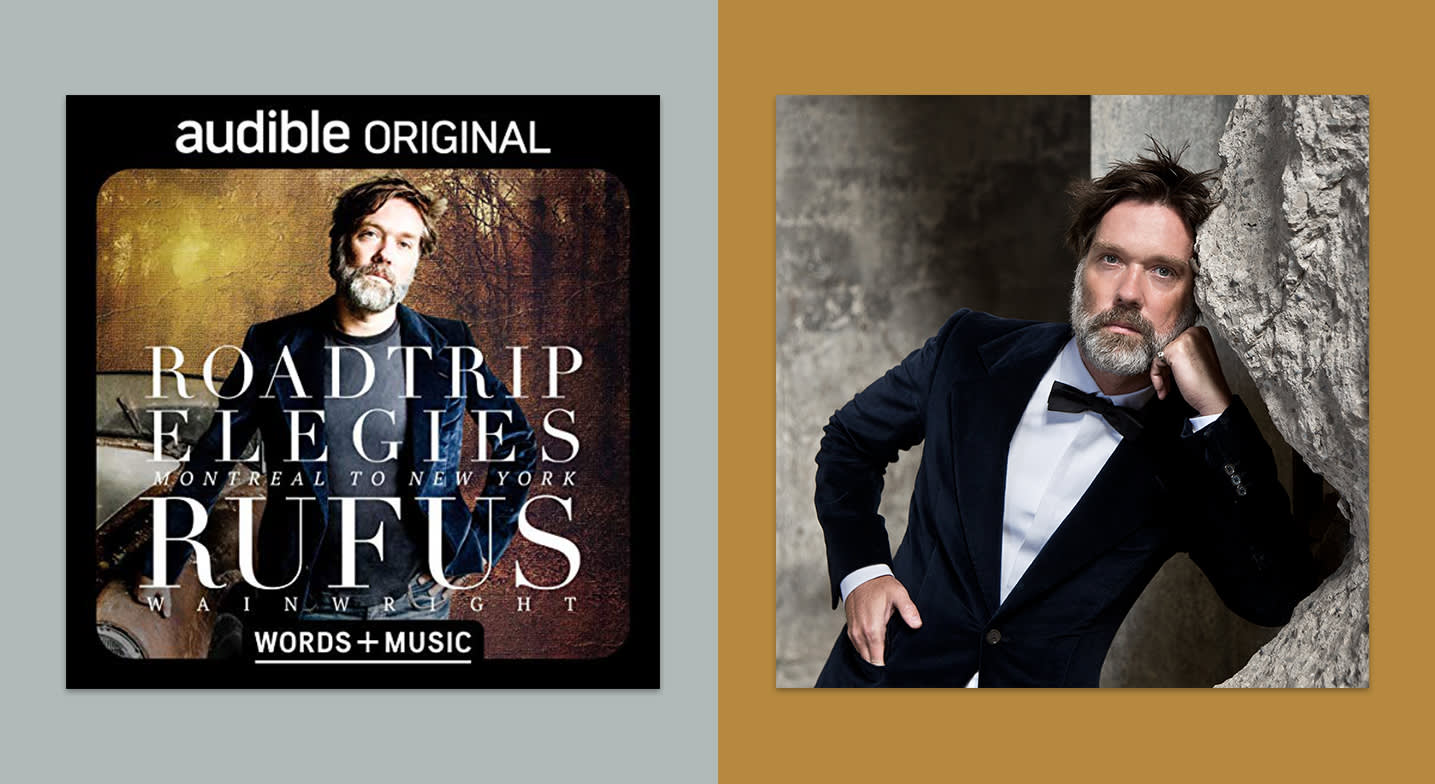Audiobooks can be many things: intimate, illuminating, heart-shattering, life-changing. But can they rock? If anyone could convince me that the answer is a resounding "HELL YES" it’s Weezer, whose albums I once copped at the old Tower Records (RIP) in ’90s-era Austin (double RIP), and whose ever-evolving, always-recognizable music keeps finding new generations of fans decades later—just ask my kids.
But while these fans were patiently awaiting the previously announced Van Weezer, the band dropped a surprise: another album, OK Human, recorded with a 38-member orchestra, inspired by Pet Sounds and our disconcerting relationship with technology. Released today, the album is lush, irresistible—and it contains a track, “Grapes of Wrath,” inspired by frontman Rivers Cuomo's deep, extremely knowledgeable passion for audiobooks. Name-checking Moby-Dick, Mrs. Dalloway, and Steinbeck’s eponymous classic, the lyrics even feature Cuomo singing, “I’m gonna rock my Audible.”
As the old adage goes, this was not on our 2021 bingo cards.
We needed to know more, so we checked in with Rivers, who graciously answered our questions and despite being on a retreat even recorded them in audio, because he's a man who knows the power of voice. Check out his responses below, and play each clip to hear Rivers in his own words.
Audible: We love Weezer here at Audible, so we were delighted—if shocked!—to learn the feeling was mutual. “Grapes of Wrath” is the first rock song about audiobooks that I’ve ever heard of. How did it come about?
Rivers Cuomo: One night a few years ago I woke up in the middle of the night and I couldn’t get back to sleep, so I decided to listen to an audiobook on Audible. I did that from time to time anyway, but this was the first time I did it in the middle of the night. I stayed up for a couple hours, just listening and listening to The Grapes of Wrath. I did not get good sleep, but it was a pretty magical experience. There’s something about that state of the brain, that time of night—I’m able to drift into this more imaginative state and really enter the world of the writer’s imagination.
The next day, I woke up and it was time to go write songs ’cause that’s what I do, and I was pretty sleepy and just feeling like, not ambitious and what’s the point? But then, I found myself in that same half-asleep brain state, and it was kind of pleasant. I remembered reading an interview with the producer Quincy Jones, and he said the whole time he was producing Michael Jackson’s Thriller, he was half-asleep behind the mixing board. He mentioned something about beta waves, like when your brain is producing these beta waves it’s a better state for creativity and imagination than when you’re fully awake and more conscious about what you’re doing. I think also I’d heard that Thomas Edison, the great inventor, was constantly dozing off as he was coming up with all these amazing inventions. So I took that opportunity of being in that beta-wave state and wrote a song about my experience listening to The Grapes of Wrath for a long time in the middle of the night.
And ever since then, I’ve gotten into this habit of listening to fiction as I’m going to sleep or in the middle of the night when I wake up. It’s just a wonderful opportunity to enter into the giant imagination and empathy of these great writers.

Late-night inspiration
On the origins of "Grapes of Wrath."
Judging from the lyrics, you’re a fan of the classics. Are there other genres you like?
Yeah, I’m a big fan of the classics. I was an English Lit major in college, and I got exposed to a lot of them at that time, and obviously earlier, in middle school, high school, public school English classes. But I also like nonfiction. I’ve found that depending on the time of the day, it changes the genre I listen to. So in the morning I go for a walk and listen to music, but then after working on music in the day, when I go for a walk in the late afternoon or after dinner, those times I like to listen to nonfiction—a lot of times it’s science, sociology, psychology, biography.
I like great nonfiction stories, like people who have gone through crazy events and made it out alive (or not). I just finished Into the Wild, the story of Chris McCandless, a young man about the same age as us Weezer guys, and right when Weezer was starting out he went into the Alaskan bush to try to survive on his own. He made it four months before eventually starving to death. So yeah, I really like listening to those kinds of stories during the day, and then at night I go deep into fiction.
“It’s just a wonderful opportunity to enter into the giant imagination and empathy of these great writers.”
And then, on rare occasions when I’m coming home from a show and it’s like 2 or 3 in the morning and I’m in the backseat of a car service, and I’m really not half-asleep but 90% asleep, then I listen to poetry. It’s kind of the only time of day I can listen to poetry. I don’t know why; it seems like you’d need to be more awake or have more mental energy to process that most difficult form of text. But for some reason, I’m able to concentrate better when I’m just barely awake.

A day in the (listening) life
On classics, nonfiction, and after-hours poetry.
OK Human has been described as a concept album that you teased as being “very much a day in the life” of yourself. Can you share how it came about?
Some people are calling OK Human a concept album. I don’t know if it’s a concept album in the strict sense—it’s thematically pretty tight, but I think normally I follow Stephen King’s advice in his memoir, On Writing. I read that a few years ago and he says, just write. Start at the beginning and write all the way to the end, and just tell a great story and that’s your first draft. Then after you’ve done that, you kind of go back and read it and notice the themes, and maybe you tweak a few things to make it more thematically tight.
That’s what OK Human is, just writing about what was happening and then noticing oh, this is kind of like the story of a day in the life of me. During the years I was writing this, 2017-18, I was thinking a lot about the changes in my life and my relationships due to technology and the devices that have taken over just about every corner of our lives.

Writing 'OK Human'
On technology and Stephen King.
When you think of that relationship between humans and technology, is it more with anxiety or awe?
My immediate emotional reaction to seeing everyone I know almost always looking at a screen and interacting with a device—rather than how it was when I was growing up, where so much we looked to each other for entertainment, connection, and some kind of mental activity—my first emotional reaction is kind of horror and a sense of loss, and fear about, gosh, if this is where we are now, what’s it going to be like 20 years from now, 100 years from now? Where is our species going?
But then from a more detached perspective, I remind myself that this is what people have probably thought for many generations as they move on in life. They’re kind of horrified by the new technologies—in the past that would have been TV, radio, or, even at one point, books. I think I remember hearing that at some point centuries ago people were horrified to see all these people sitting around looking at these pieces of paper! So I remind myself of that, and also remind myself that this is all pretty much completely out of our control—and definitely out of my control—so there’s not much to do about it except sit back and marvel, and write an album about it.

'Where is our species going?'
On the horrors and marvels of tech.
You engage with your fans on so many different platforms and in real time. How has that been for you? I imagine this was not part of the rockstar lifestyle you envisioned starting out.
When Weezer started in the early/mid-’90s, our relationship with our fans was pretty similar to how it was for bands when I was a kid. As a fan of heavy metal bands, it’s like you’d get fan mail and then maybe you’d see them out in the audience or outside the venue or at the hotel, people trying to get autographs and give you gifts, that sort of thing. But there wasn’t much communication beyond that.
But pretty quickly it changed as the ’90s wore on, and around the time of our third album in 2001, we were kind of in constant communication with our most hardcore fans on the Weezer.com message board and other forums. There was a lot of passing ideas back and forth—a form of collaboration, or at least, getting a lot of instantaneous feedback from the audience that bands of previous generations didn’t have. Perhaps that’s one reason we’ve managed to keep our heads above water all these decades now is we keep getting real-time new information from the audience, we’ve never been cut off—I don’t know, just a theory!
“This is all pretty much completely out of our control—and definitely out of my control—so there’s not much to do about it except sit back and marvel, and write an album about it.”
And now it’s expanded to the big social media platforms, and that ended up feeling kind of crummy to me somehow. I don’t feel great when I’ve been hanging out on Twitter all day or even Instagram, so a year ago I started making my own website, riverscuomo.com, and I built a chatroom there and a couple of other ways for me and the audience to exchange information. It’s cool, it’s like being a little god of a universe on there, ’cause I can kind of control the laws of physics in that universe, manipulating what people are able to say—if they say one thing it might end up appearing completely different in the text depending on the rules I’ve written into the script, so that’s pretty fun.
But anyway, I can definitely have a big influence on the culture there and it doesn’t turn into what I think many of us feel about the big social media platforms now, where they kind of feel like a dumpster fire which is not where you want to hang out all day, especially with the people that you most want to engage with. So that’s pretty fun, and maybe that’s a new frontier for artists, if not other leaders of society, to make your own little online universe.

Out of the dumpster fire
On carving out their own pathways to fans.
What audiobooks do you think Weezer fans should listen to?
One audiobook I’d recommend to Weezer fans is Yuval Noah Harari’s Sapiens. I know it’s an extremely popular book, but a lot of people probably still haven’t read it, so you might want to check that one out. It’s accessible, and yet it has a very sweeping view of our species from the dawn of its evolution up to the current day, and then some musings about where the heck we’re going, and it’s pretty eye-opening to get that big-picture perspective.
In fiction, I would recommend 100 Years of Solitude by Gabriel García Márquez, another sweeping view, of a century in the life of this family and the changes as they enter modern times. It’s written with incredible empathy and humanity, and it’s quite moving.

Rivers recommends
On audiobooks for Weezer fans.
Check out Weezer's first audio liner notes
Stream Weezer's new album OK Human, featuring "Grapes of Wrath," on Amazon Music. For more listening recommendations, rock Audible with Weezer, and check out the (first ever!) audio liner notes, featuring Weezer in conversation with Jaron Lanier.




